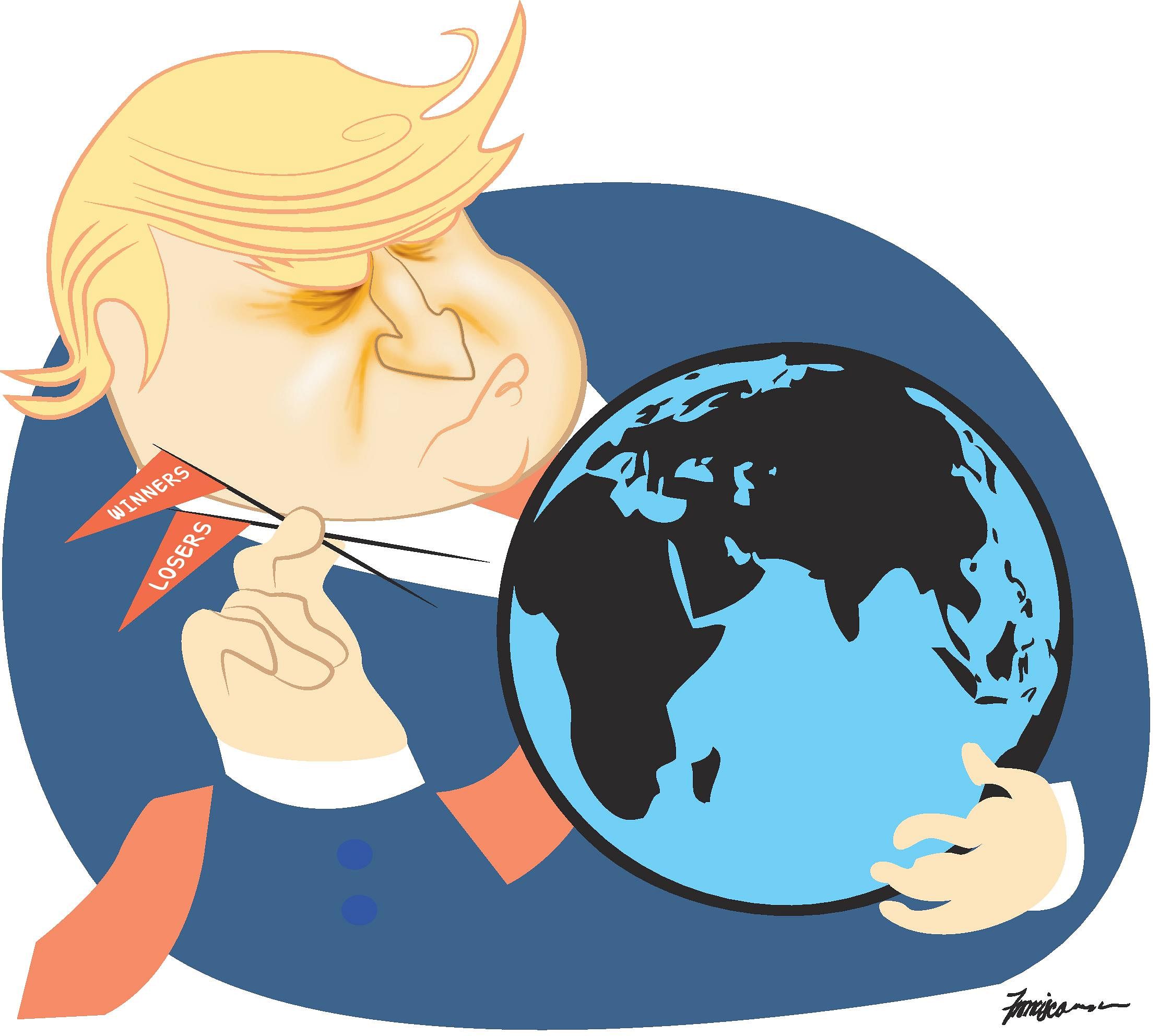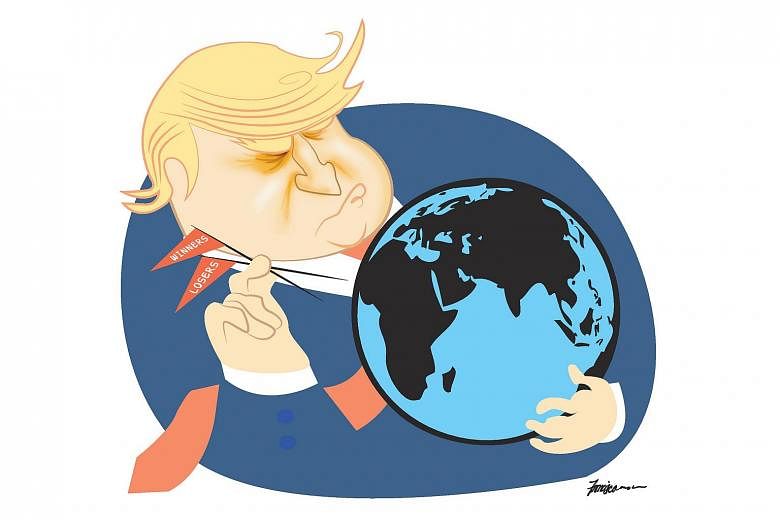LONDON • "He came here to learn. He came here to get smart. His views are evolving." That's how a White House senior official described the just-concluded visits of United States President Donald Trump to the Middle East and Europe, his maiden foreign trips since assuming office.
For a president who likes his home comforts and who clearly dreaded this outing since he knew that all the world's media would be waiting to pounce on anything gauche he may do or say, the foray was clearly a success; there were plenty of small slip-ups, but nothing major or embarrassing.
Still, Mr Trump's first foreign debut was not about learning, or about smartening up. Instead, his trips reconfirmed the American leader's view of a world as a zero-sum game in which almost everything Washington does should boil down to a pure transactional relationship between a winner and many losers.
It was a hard-line performance which dismayed the Europeans, who dared to believe that Mr Trump was ready to tone down his pre-election harsh stances, only to discover now that this was not the case. But it was also a trip which confused America's Middle Eastern allies, and undoubtedly complicated US policy in the region.
COMEDY OF ERRORS
Mr Trump's comical missteps may have been small, but they were revealing, since they inadvertently told us a great deal about the President's real thinking. Upon arrival in Israel after a visit to Saudi Arabia, for instance, he told his visibly discomfited Israeli hosts that he "just got back from the Middle East", a slip-up which indicated that, in common with many other American right-wingers, President Trump simply does not regard the Jewish state as part of that region.
During his meetings with leaders in Europe, he kept referring to all his counterparts as "presidents", despite the fact that most of them are prime ministers; mercifully, he did know that Theresa May is not Britain's president.

Mr Trump also shoved aside the prime minister of the tiny European state of Montenegro in order to get to the front row for a collective photograph with Europe's leaders; those who refuse to acknowledge America's "top dog" position evidently need a reminder of this fact.
He did not even bother to wear his translation headphones when the Italian prime minister addressed leaders of the G-7 group of most industrialised nations; either the US President had no interest in discovering what his Italian colleague had to say, or Mr Trump was simply protecting his carefully sculpted hairdo.
The White House media handlers also experienced some "issues", as they now like to refer to any snafu. They allowed President Trump to be photographed holding hands with the Saudi king and the Egyptian president above a glowing orb; the event was meant to mark the opening of a new centre for combating extremist ideology, but produced images worthy of some sinister scene from a 1960s-vintage James Bond movie.
Mr Trump's media officials also circulated misspelt press releases to journalists, enthusing about the President's efforts to promote a "lasting peach" in the Middle East; "make fruit, not war" may turn out to be a catchy slogan.
Still, those who hosted Mr Trump during his trips were also guilty of some goofy moments. At Tel Aviv airport, Israeli Prime Minister Benjamin Netanyahu publicly welcomed the "President of the United States and his first wife"; Mrs Trump is America's First Lady, but she was just a mere child when Mr Trump married his first wife.
In an effort to humour Mr Trump, German Chancellor Angela Merkel surreptitiously whispered words in the President's ear in antics worthy of a teenage school girl. And the first thing Pope Francis wanted to know from Mrs Trump is what she cooks for her husband, a comment which says more about the Pontiff's view of the role of women, than about his interest in the White House cuisine.
And then, there were the slanging handshake matches between Mr Trump and French President Emmanuel Macron, both competing for the title of the Western world's alpha male.
In short, Mr Trump's hosts were not gaffe-free either. Yet, hilarity aside, the message which the US President delivered everywhere he went raised more questions than it answered about America's future contributions to global stability.
US POLICY: MORE QUESTIONS THAN ANSWERS
Saudi Arabia has the most reason to be satisfied with the current US leader, largely because it knows how to handle him. For Mr Trump was interested in concluding mega-billion-dollar arms sales contracts, which is precisely what the Saudis are good at offering, and seems to enjoy lavish hospitality, of which the Saudis have an inexhaustible supply.
President Trump's determination to treat Saudi Arabia as the centre point of a new Gulf-based security structure and Washington's willingness to identify Iran as the chief disrupter in the region are also music to Saudi ears.
But when all the backslapping and sword-dances ended in Riyadh and the US presidential caravan left, the Saudis were left none the wiser about how significant the US commitment to their security is. Neither was Mr Trump very specific about what he will do on Iran; his administration still deems the US nuclear deal with Iran as a "terrible mistake", yet has said nothing about either respecting or repudiating that document. And identifying the Saudis as the Gulf's chief security coordinator is not cost-free either: the American move has already prompted a bitter spat between the Saudis and Qatar, the oil-rich emirate which has no intention of being dictated to by its far bigger neighbour.
Israel finds itself in a similar predicament: it hosted a successful US visit, heard plenty of warm speeches, yet it obtained no serious pointers to the future. The Israelis don't know what the American plans are for handling the civil war in Syria. They also don't know if Mr Trump intends to restart the peace dialogue with the Palestinians. And, of course, Mr Trump's electoral promise to shift the US embassy from Tel Aviv to Jerusalem remains unfulfilled; in a typical Trumpian way, it's neither refuted nor revived, but simply rehashed.
Yet it was the Europeans who were truly rattled by Mr Trump's tour. They have done everything possible to make the Trump visit as easy as possible. Both the summit of the Nato military alliance and the subsequent G-7 meeting were held under "controlled environments", with journalists kept at a respectful distance, sessions being kept short, no press conferences and no other onerous duties.
On the eve of Mr Trump's arrival, Nato's European member-states also agreed that their alliance will divert attention to fighting global terrorism, just as the US President has asked. They also pledged to increase defence budgets.
Yet, despite all these efforts, Mr Trump simply refused to oblige the Europeans by reiterating the validity of Nato's mutual security guarantee, which pledges all member-states to come to each other's assistance if any of them is attacked. And, despite all their strenuous appeals, the Europeans also failed to extract a promise from Mr Trump that the US will respect treaties combating climate change.
Instead, President Trump called the Germans "bad, very bad", for allegedly flooding US markets with their cars, conveniently ignoring the fact that German cars account for only 7 per cent of annual US car sales, that many of these cars are actually manufactured in the US. All these messages in a grumpy, humourless style which Mr Trump has already made his hallmark.
European governments take heart from the fact that, despite these tensions, the US administration has increased the money it spends on its military in Europe, and continues to deploy troops to the continent; "let's look at the facts of the deepening US military commitments to Europe, rather than the media reports", Mrs Rose Gottemoeller, Nato's Deputy Secretary-General, told me soon after Mr Trump left Europe.
Still, a consensus seems to be forming that, instead of narrowing, the gap between Mr Trump's view of the world and that of the Europeans is widening, and that the only option available to America's closest allies is to protect their transatlantic relationship by trying to deal largely with Secretary of State Rex Tillerson or Defence Secretary James Mattis, both of whom are regarded as professionals of the old school.
"Meanwhile, thank God for small mercies; at least the US President did not tweet much through his tour," a senior European official sighed, with no hint of irony.


